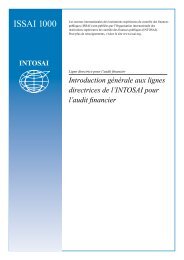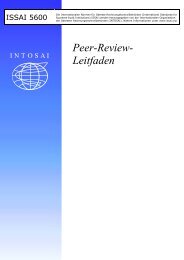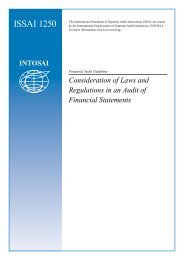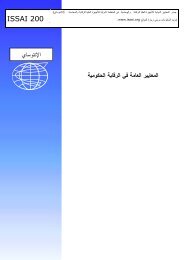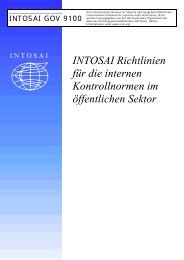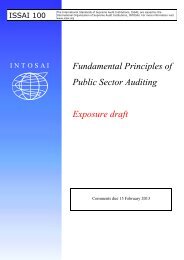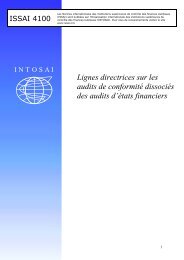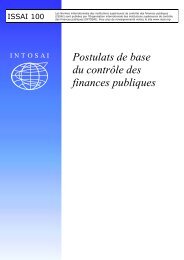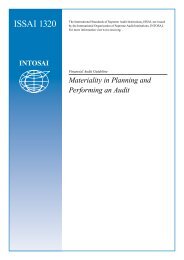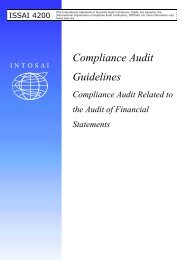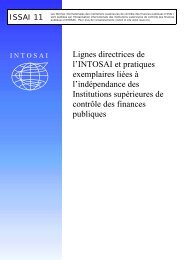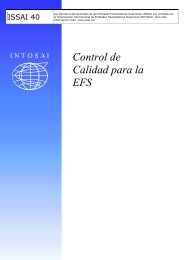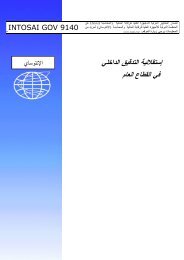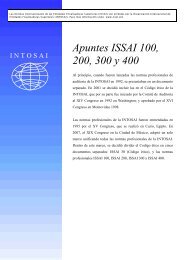ISSAI 1240
ISSAI 1240
ISSAI 1240
Create successful ePaper yourself
Turn your PDF publications into a flip-book with our unique Google optimized e-Paper software.
<strong>ISSAI</strong> <strong>1240</strong><br />
ISA 240<br />
THE AUDITOR’S RESPONSIBILITIES RELATING TO<br />
FRAUD IN AN AUDIT OF FINANCIAL STATEMENTS<br />
statement users. It can be caused by the efforts of management to manage<br />
earnings in order to deceive financial statement users by influencing their<br />
perceptions as to the entity’s performance and profitability. Such earnings<br />
management may start out with small actions or inappropriate adjustment of<br />
assumptions and changes in judgments by management. Pressures and incentives<br />
may lead these actions to increase to the extent that they result in fraudulent<br />
financial reporting. Such a situation could occur when, due to pressures to meet<br />
market expectations or a desire to maximize compensation based on<br />
performance, management intentionally takes positions that lead to fraudulent<br />
financial reporting by materially misstating the financial statements. In some<br />
entities, management may be motivated to reduce earnings by a material amount<br />
to minimize tax or to inflate earnings to secure bank financing.<br />
A3. Fraudulent financial reporting may be accomplished by the following:<br />
• Manipulation, falsification (including forgery), or alteration of<br />
accounting records or supporting documentation from which the<br />
financial statements are prepared.<br />
• Misrepresentation in, or intentional omission from, the financial<br />
statements of events, transactions or other significant information.<br />
• Intentional misapplication of accounting principles relating to amounts,<br />
classification, manner of presentation, or disclosure.<br />
A4. Fraudulent financial reporting often involves management override of controls<br />
that otherwise may appear to be operating effectively. Fraud can be committed<br />
by management overriding controls using such techniques as:<br />
• Recording fictitious journal entries, particularly close to the end of an<br />
accounting period, to manipulate operating results or achieve other<br />
objectives.<br />
• Inappropriately adjusting assumptions and changing judgments used to<br />
estimate account balances.<br />
• Omitting, advancing or delaying recognition in the financial statements<br />
of events and transactions that have occurred during the reporting<br />
period.<br />
• Concealing, or not disclosing, facts that could affect the amounts<br />
recorded in the financial statements.<br />
• Engaging in complex transactions that are structured to misrepresent the<br />
financial position or financial performance of the entity.<br />
• Altering records and terms related to significant and unusual<br />
transactions.<br />
A5. Misappropriation of assets involves the theft of an entity’s assets and is often<br />
perpetrated by employees in relatively small and immaterial amounts.<br />
15<br />
250 The Auditor’s Responsibilities Relating to Fraud in an Audit of Financial Statements



